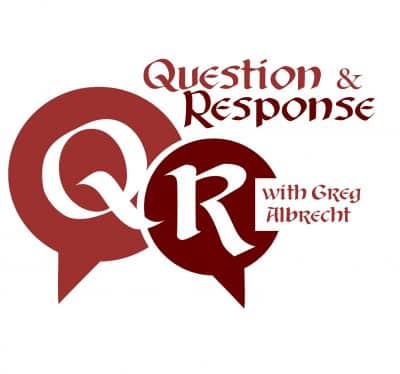Q&R with Brad Jersak: Do only Christians Love with Agape (1 John 4:16)
Question
Many years ago, I said to a fundamentalist that according to 1 John 4:16 and according to what Jesus says at the Last Supper, loving one another is itself participating in the life of God because God is Love. I think that you made a similar point in A More Christlike Way. The response that I got was that agape referred specifically to the love that is only possible after receiving the Holy Spirit. Therefore, it is not possible for non-believers love in that way. What you have to say about that?
Response
First, let’s read 1 John 4:16 in context:
- 7 Dear friends, let us love one another, for love comes from God. Everyone who loves has been born of God and knows God.8 Whoever does not love does not know God, because God is love. 9 This is how God showed his love among us: He sent his one and only Son into the world that we might live through him.10 This is love: not that we loved God, but that he loved us and sent his Son as an atoning sacrifice for our sins. 11 Dear friends, since God so loved us, we also ought to love one another. 12 No one has ever seen God; but if we love one another, God lives in us and his love is made complete in us.
- 13 This is how we know that we live in him and he in us: He has given us of his Spirit. 14 And we have seen and testify that the Father has sent his Son to be the Savior of the world. 15 If anyone acknowledges that Jesus is the Son of God, God lives in them and they in God. 16 And so we know and rely on the love God has for us.
- God is love. Whoever lives in love lives in God, and God in them.17 This is how love is made complete among us so that we will have confidence on the day of judgment: In this world we are like Jesus. 18 There is no fear in love. But perfect love drives out fear, because fear has to do with punishment. The one who fears is not made perfect in love.
- 19 We love because he first loved us. 20 Whoever claims to love God yet hates a brother or sister is a liar. For whoever does not love their brother and sister, whom they have seen, cannot love God, whom they have not seen. 21 And he has given us this command: Anyone who loves God must also love their brother and sister.
Fifteen occurrences of LOVE in just 25 verses. John, the “beloved apostle” or “apostle of love” comes by those titles honestly! First, let’s look at the alternative view your colleagues presented, then turn to John’s point.
The idea that imagines agape love (the self-giving love that comes from God) is the sole property of Christians is a rather horrendous misinterpretation of John’s point. Indeed, such a notion is itself uncharitable (i.e., not agape) in its contempt for all those who have laid down their lives for the other, even apart from faith in Christ. It is disturbing to imagine the implications of such superior-than-thou thinking that diminishes the quality of love in those who have not joined our insiders’ club.
The problems with this way of thinking are at least three-fold. First, it ignores and redefines the ancient sense of the word agape. John can see it in practice both within and beyond the walls of the church. The common use of the word (which is how we define terms) included love in general, brotherly love, affection, goodwill, and benevolence.
Next, in Christian circles, we came to see it as the love God has for us, unfailing love, and the love that lays its life down for the other. But what if we dramatically narrow the term to apply only to its greatest expression? According to Jesus, “Greater love has no one than this: to lay down one’s life for one’s friends” (John 15:13). To emulate such love is the highest form of agape: “This is how we know what love is: Jesus Christ laid down his life for us. And we ought to lay down our lives for our brothers and sisters” (1 John 3:16).
I suppose I’d want to ask the Christian-only-agape people if they have actually done that. When did they do that? How did they do that? It doesn’t always end in the actual death of the one who loves. Paul describes this Christlike love as putting others’ interests ahead of our own. In either case, I can offer an abundance of examples of “non-Christian” people who sacrificially serve the needs of others and have even given their lives to save a brother, sister, neighbor, or stranger. First responders are an incredible example of agape, because agape is far more than an affectionate feeling one holds for those dear to them. It is any self-giving act that emulates the Savior.
Finally, the logic of John concerning love is precisely aimed at the insiders’ club mentality. He starts with love in action. He observes love in practice and makes that his criteria for knowing God, not visa versa. He doesn’t say, “If you are a Christian, your love is real. If you’re not a Christian, your love is second-rate.” Rather, he says to Christians, “If you love, you know God. If you don’t love, you don’t know God. To claim otherwise is fraudulent.” He then goes on to lay out his logic, always starting with God’s love first.
We love because God loved us first. We know this because God showed us this love in Jesus.
If we love, we are born of God. Because God IS love.
If we love, we know God. Because God IS love.
If we love, God lives in us. Because God IS love.
If we love, God’s love is made complete in us. Because God IS love.
If we love, God’s love drives out our fear. Because God IS love.
The fact is that a life lived in love messes with our categories, assumptions, and presumptions about who is in and who is out. And that’s exactly what John is up to in 1 John 4. What is a Christian? Someone who claims to be? Someone who uses his name a whole lot? Someone who assents to the right creed or joins the right movement?
Not for John. For John, the “children of God” are those who love. Those whose lives look like the self-giving love of God seen in Jesus. How do we know who has passed from death into eternal life? “We know that we have passed from death to life, because we love each other. Anyone who does not love remains in death” (1 John 3:14). So, John’s exhortation is not to believe right so you’ll love right, but to love God as he first loved us by loving each other, “not with words or speech but with actions and in truth”. (1 John 3:18).











 Plain Truth Ministries | Box 300 | Pasadena, CA 91129-0300
Plain Truth Ministries | Box 300 | Pasadena, CA 91129-0300

